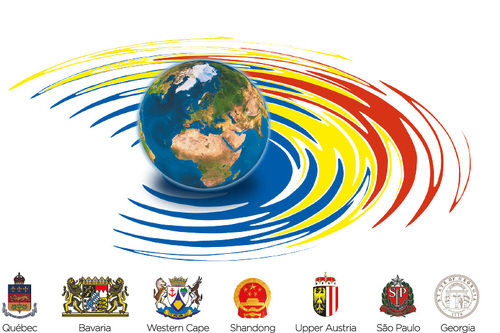In recent decades, federated states and regions have been increasingly challenged by a growing number of international issues. In this context, the Regional Leaders Summit (RLS), a grouping composed of seven regional governments, spread over five continents, was born out of a desire to establish a privileged network dedicated to the sharing of expertise in several key areas.
For nearly two decades, heads of government in Bavaria (Germany), Western Cape (South Africa), Georgia (United States), Upper Austria (Austria), São Paulo (Brazil), Shandong (China) and Québec (Canada) have attended this biennial meeting, which alternately take place in each member region. These gatherings encourage discussions on common issues as well as the sharing of analyses and policies. They also aim to generate multilateral partnerships that will benefit their respective citizens. With this in mind, the outcomes of the discussions and cooperation projects discussed at each Conference are recorded into a joint Final Declaration, which sets out the various actions and ambitions that the signatory governments should seek to achieve.
Member regions
Member regions represented over 187 million people from diverse linguistic and cultural backgrounds, with a total of 4 % of global economic output.
- Bavaria (Germany)
- Georgia (United States)
- Québec (Canada)
- Sao Paulo (Brazil)
- Shandong (China)
- Upper Austria (Austria)
- Western Cape (South Africa)
History
The inception of the RLS takes root in a series of meetings held in 1999, under the theme “Your Partner is my Partner”, which were attended by the Bavarian Minister-President, the Premier of Quebec, the Premier of the Western Cape and the Governor of the Shandong Province. The subsequent inclusion of three new members – Georgia, Upper Austria and São Paulo – allowed the participating heads of Government to get a better sense of the reality of each region and to identify common challenges and themes.
An exchange of information and expertise between regions (especially government agencies), then followed. Initially, the discussions focused on sustainable development, youth and innovation. Later on, other subject areas, such as education and transport, were added to the list.
These direct and privileged relations between members have helped ensure the participation of regional economic delegations in Summit meetings, which has helped intensify trade relations.
Another milestone for the RLS has also been the launch of a scientific network on renewable energies. This has ushered in a new era, by solidifying long-term multilateral cooperation between member regions. This turning point was followed by the addition of three new research and development themes to the current Energy Network. They were chosen carefully, as they reflect the best potential for scientific cooperation between the seven regions: digital, aerospace and mini-satellites. With the help of leading researchers in various fields, multilateral collaborative projects have been developed and are now being implemented. Every two years, the Regional Leaders Summit welcomes experts and scientific coordinators that are proactive in these projects.
Undoubtedly, these multilateral meetings have intensified bilateral relations between the regions.
Fostering common initiatives

The driving spirit of the Summit is firmly focused on cooperation and action aimed at fostering common initiatives, particularly regarding sustainable development. These initiatives contribute to information sharing and the drafting of action plans leading to the adoption of government policies that will reconcile:
- economic development
- social protection
- the sustainable preservation of essential life resources
- promoting cultural diversity for future generations.
The Summit also provides a forum for bilateral talks between heads of government to:
- report on their relations
- strengthen their ties
- discuss issues common to the Partner Regions
- develop an effective network to deal with the many issues that partners face internationally.
The outcome of the discussions and the cooperation projects are then recorded in a joint declaration.
